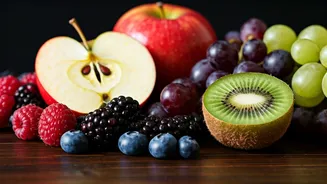Introduction: Sweet Dilemma
Diabetes management often involves careful control of carbohydrate intake, including sugars. This can make people with diabetes wary of fruits, which naturally
contain sugars like fructose. However, many fruits offer valuable nutrients and can be included in a diabetes-friendly diet. The key is to choose fruits wisely, considering their glycemic index (GI), glycemic load (GL), and overall nutritional value. The following list presents ten fruits that, when consumed in moderation and as part of a balanced diet, can satisfy a sweet tooth without causing dramatic spikes in blood sugar levels. These fruits are generally lower on the GI scale and offer essential vitamins, minerals, and fiber, promoting overall health and well-being. It is important to remember that individual responses to foods can vary, and consulting with a healthcare professional or a registered dietitian is always recommended for personalized dietary advice.
Berries: Tiny Powerhouses
Berries, including strawberries, blueberries, raspberries, and blackberries, are a fantastic choice for people with diabetes. They are relatively low in carbohydrates and high in fiber, which helps to slow the absorption of sugar into the bloodstream. Fiber is a crucial component of a diabetes-friendly diet, contributing to better blood sugar control and promoting a feeling of fullness. These little fruits also pack a powerful punch of antioxidants, protecting the body from cellular damage. Antioxidants are beneficial for overall health, and berries are particularly rich in them. Berries offer a natural sweetness and can be enjoyed in various ways, such as in smoothies, yogurt parfaits, or simply as a refreshing snack. Including berries in your diet is a flavorful way to incorporate essential nutrients and support overall well-being. Remember that portion control is essential. Even with their lower GI, enjoying berries in moderation is still key for maintaining stable blood sugar levels.
Cherries: Sweet But Smart
Cherries, with their delightful sweetness, might seem like a surprising inclusion on this list, but they can indeed be enjoyed by people with diabetes, especially when eaten in moderation. While cherries do have natural sugars, they also contain fiber and various vitamins and minerals. The fiber content helps slow down the release of sugar into the bloodstream, which is critical for managing blood sugar levels. Cherries are also a source of antioxidants, adding another layer of health benefit. When choosing cherries, opt for fresh, whole cherries over processed versions, such as canned cherries in syrup. You can enjoy them as a standalone snack, added to salads, or incorporated into other recipes. Remember to pay attention to portion sizes. A small serving of cherries can be a delightful and healthy treat for those with diabetes, offering both sweetness and essential nutrients.
Apples: A Classic Choice
Apples are a classic, readily available fruit that can be a part of a diabetes-friendly diet. They are a good source of fiber, particularly soluble fiber, which helps to regulate blood sugar levels by slowing down glucose absorption. The fiber in apples also promotes healthy digestion and can contribute to feelings of fullness, helping to manage weight. Apples offer a satisfying crunch and a natural sweetness, making them a great snack option. When incorporating apples into your diet, it's best to consume them with the skin on, as the skin contains a significant amount of fiber. Choose whole apples over apple juice, as the juice removes the fiber and can cause a rapid spike in blood sugar. Enjoy apples sliced, added to salads, or paired with a small amount of healthy fat, such as a few nuts, to further slow down sugar absorption. Apples are a versatile and nutritious fruit that can be a valuable addition to a balanced diabetes diet.
Pears: Similar Benefits
Pears share many of the benefits of apples and can be another excellent choice for individuals with diabetes. Like apples, pears are a good source of fiber, which aids in blood sugar regulation. Fiber helps to slow the digestion and absorption of sugars, preventing sharp spikes in blood glucose levels. Pears also provide vitamins, minerals, and antioxidants, contributing to overall health. It is advisable to eat pears with the skin intact to maximize the fiber intake. Pears offer a subtle sweetness and a pleasant texture, making them a satisfying snack. They can be enjoyed fresh, sliced, or added to salads and other dishes. As with other fruits, moderation is key. A portion-controlled serving of pears, especially when combined with a protein source or healthy fat, can be a delicious and nutritious option for those managing diabetes, offering both sweetness and beneficial nutrients.
Oranges: Vitamin C Boost
Oranges are a good source of vitamin C and other essential nutrients. Oranges provide a moderate amount of carbohydrates. While oranges do contain natural sugars, they also offer fiber, which helps to mitigate the impact of sugar on blood sugar levels. Additionally, oranges have a relatively low glycemic index, meaning they don't cause a rapid rise in blood sugar when consumed in moderation. They are also rich in antioxidants, contributing to overall health. Oranges are a refreshing and flavorful fruit that can be enjoyed in various ways. It is recommended to eat whole oranges instead of drinking orange juice, as the juice lacks the fiber found in the fruit. Incorporate them as a snack, add slices to salads, or include them in your breakfast. The natural sweetness and vitamin content make them a healthy addition to a diabetes-friendly diet, providing both enjoyment and beneficial nutrients.
Peaches: Sweet and Versatile
Peaches are another delicious fruit that can be enjoyed in moderation by individuals with diabetes. They contain moderate amounts of carbohydrates and natural sugars, but they also provide fiber, which helps to moderate blood sugar responses. Peaches are a source of vitamins and antioxidants. Enjoy peaches fresh, sliced, or in other recipes, such as added to salads or smoothies. Choose fresh peaches over canned peaches in syrup, which often contain added sugars. Consume peaches as part of a balanced meal or snack, along with protein and healthy fats, to further moderate the blood sugar impact. The sweet and versatile nature of peaches makes them a delightful option for those seeking a tasty treat while managing their diabetes, offering a balance of flavor and essential nutrients.
Plums: Fiber-Rich Snack
Plums are a tasty and nutritious fruit that can be included in a diabetes-friendly diet. They offer a good source of fiber, which plays a crucial role in blood sugar control by slowing down the absorption of sugar. Plums also contain vitamins, minerals, and antioxidants, providing several health benefits. The fiber content in plums helps to promote feelings of fullness and can contribute to better weight management. Plums can be enjoyed fresh, dried (prunes), or in various culinary preparations. It is advisable to consume plums in moderation, especially if they are dried, as the drying process can concentrate the sugars. Incorporate them into snacks, add them to your meals, or enjoy them as a part of a balanced diet. Plums can add both sweetness and nutritional value, making them a good choice for those wanting to enjoy a treat while taking care of their health.
Kiwi: Tropical Treat
Kiwis are a nutritional powerhouse that can fit into a diabetes-conscious diet. Kiwis are relatively low in carbohydrates and have a moderate glycemic index. They provide a good amount of fiber, contributing to slower sugar absorption, which is beneficial for blood sugar management. They are also packed with vitamin C and other antioxidants, supporting overall health. Kiwis offer a unique, slightly tart flavor and can be enjoyed in various ways. They can be eaten fresh, sliced, added to smoothies, or included in fruit salads. Kiwis offer essential vitamins and nutrients while keeping the impact on blood sugar relatively manageable. Consume kiwis as part of a balanced meal or snack to further moderate any effect on blood glucose. The distinctive flavor and nutritional value of kiwis make them a delightful and healthy addition to a diabetes-friendly diet.
Grapefruit: Citrus Option
Grapefruit can be a part of a diabetes-friendly eating plan due to its fiber content and relatively low glycemic index. Grapefruit is a source of soluble fiber, which slows down the absorption of sugar and helps manage blood sugar levels. Grapefruit is also rich in vitamin C and other nutrients that are important for overall health. Consuming grapefruit in moderation can provide health benefits without causing significant spikes in blood glucose levels. Grapefruit has a unique tart flavor and can be enjoyed fresh, added to salads, or incorporated into other dishes. Choose fresh grapefruit over canned versions, which may have added sugars. When eating grapefruit, it's best to combine it with protein or healthy fats to further manage the impact on blood sugar. When incorporated into a balanced diet, it's a refreshing option, offering both flavor and valuable nutrients while supporting healthy blood sugar control.
























